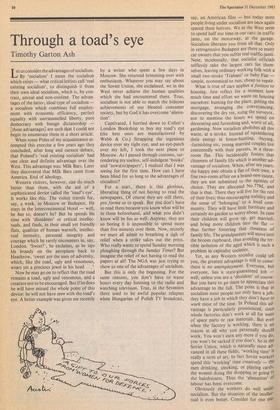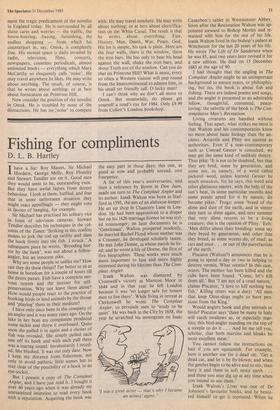Through a toad's eye
Timothy Garton Ash
et us consider the advantages of socialism. la By 'socialism' I mean the socialism which exists — what critical leftists call 'real existing socialism', to distinguish it from their own ideal socialism, which is, by con- trast, unreal and non-existent. The advan- tages of the latter, ideal type of socialism — a socialism which combines full employ- ment with economic efficiency, perfect equality with untrammelled liberty, pure democracy with benign dictatorship — [these advantages] are such that I could not begin to enumerate them in a short article.
When some Poles of my acquaintance at- tempted this exercise a few years ago they concluded, after long and earnest debate, that. Poland's 'real existing socialism' had one clear and definite advantage over the West. This advantage was: Milk Bars. Later they discovered that Milk Bars came from America, End of ideology.
Western visitors, however, can do much better than them, with the aid of a sophisticated device called the `toad's eye'. It works like this. The visitor travels for, say, a week, to Moscow or Budapest. He stays in the Intercontinental Hotel — well, he has to, doesn't he? But he spends his time with 'dissidents' or critical intellec- tuals, and finds, in their small yet friendly flats, qualities of human warmth, intellec- tual intensity, personal integrity and courage which he rarely encounters in, say, London. `Sweet!', he exclaims, as he sips his brandy on the aeroplane back to Heathrow, 'sweet are the uses of adversity, which, like the toad, ugly and venomous, wears yet a precious jewel in his head ...'
Now he may go on to reflect that the toad remains a toad, ugly and venomous, and a creature not to be encouraged. But if he does he will have missed the whole point of this device: he will not have seen with the toad's eye. A better example was given me recently by a writer who spent a few days in Moscow. She returned brimming over with enthusiasm. Whatever you may say about the Soviet Union, she exclaimed, we in the West never achieve the human qualities which she had encountered there. True, socialism is not able to match the hideous achievements of our bloated consumer society, but by God it has overcome 'aliena- tion'.
Captivated, I hurried down to Collett's London Bookshop to buy my toad's eye (the best ones are manufactured by Webb & Co.) Strapping the ingenious device over my right eye, and an eye-patch over my left, I took the next plane to Moscow. As I passed through customs, sur- rendering my useless, self-indulgent 'books' and 'news(sic)papers', I realised that J was seeing for the first time. How can I have been blind for so long to the advantages of socialism?
For a start, there is this glorious, liberating thing of not having to read the newspapers. Of course they are still there, pro forma so to speak. But you don't have to read them because you know what will be in them beforehand, and what you didn't know will be lies as well. Anyway, they are so boring it is impossible to spend more than five minutes over them. Now, secretly we must all admit to breathing a sigh of relief when a strike takes out the press. Who really wants to spend Sunday morning ploughing through the Sunday Times? But imagine the relief of not having to read the papers at all! The NGA was just trying to show us one of the advantages of socialism.
But this is only the beginning. For the same reasons, you don't have to waste hours every day listening to the radio and watching television. True, in the Seventies there used to be awful popular relapses when Hungarian of Polish TV broadcast, say, an American film — but today most people living under socialism are once again spared these horrors. We in the West seem to spend half our time in our cars: in traffic jams, on the motorway, at the garage.
Socialism liberates you from all that. Only in retrogressive Budapest are there so many car owners that you suffer real traffic-jam's.
Note, incidentally, that socialist officials selflessly take the largest cars for them- selves, leaving ordinary working folk with a small two-stroke `Trabane or baby Fiat simple, economical to run, cheap to repair.
What is true of cars applies d fortiori to housing. Just reflect for a moment how much time and effort we waste on housing ourselves: hunting for the place, getting the mortgage, arranging the conveyancing, discovering the dry rot, suing the surveyor, not to mention the hours we spend on decorating and furnishing and, worst of all, gardening. Now socialism abolishes all this waste, at a stroke. Instead of squandering their energy in house-hunting, -buying, -furnishing etc, young married couples live contentedly with their parents, in a three- room flat. This incidentally fosters that closeness of family life which is another ad- vantage of socialism. When, after ten years, the happy pair obtain a flat of their own, a fine two-room affair on a brand-new estate, they are not submitted to the agonies of choice. They are allocated No.779d, and that is that. There they will live for the rest of their lives; thus encouraging stability and the sense of 'belonging' to a local com- munity. They will have little furniture and certainly no garden to worry about. In time their children will grow up, get married, and bring more children into the flat thus further fostering that closeness of family life. The grandparents will move into the broom cupboard, thus avoiding the ter- rible isolation of the aged which is such a problem in capitalist societies. Yet, as 'any Western socialist could tell you, the greatest advantage is still to come: there is no unemployment. Everyone, but everyone, has a state-guaranteed job — well, unless you are a 'dissident' of course. But you have to go there to appreciate this advantage to the full. The point is that in socialism most people not only have a job, they have a job in which they don't have to work most of the time. In Poland this ad- vantage is particularly pronounced, since whole factories don't work at all for want of spare parts or raw materials. But even when the factory is working, there is no reason at all why you personally should work. You won't earn any more if you do, you won't be sacked if you don't. So in the Soviet Union, which is naturally most ad- vanced in all these fields, 'working time' is really a term of art. In fact Soviet workers spend this 'working' time creatively — the men drinking, smoking, or playing cards, the women doing the shopping or going 10 the hairdressers. Thus the 'alienation' Of labour has been overcome.
Obviously the workers do well under socialism. But the situation of the intellec- tual is even better. Consider for one Ma'
ment the tragic predicament of the novelist in England today. He is surrounded by all those cares and worries — the traffic, the house-hunting, -buying, -furnishing, the endless shopping — from which his counterpart in, say, Omsk, is completely free. His mental space is daily invaded by radio, television, films, concerts, newspapers, countless periodicals, almost unlimited books — everything which Mary McCarthy so eloquently calls 'noise'. He may travel anywhere he likes. He may write about anything. The result, of course, is that he writes about nothing: or at best about fornication on Primrose Hill.
Now consider the position of the novelist in Omsk. He is troubled by none of the distractions. He has no :noise' to compete
with. He may travel nowhere. He may write about nothing; or at best about electrifica- tion on the White Canal. The result is that he writes about everything: Fate, History, Man, Death, War, Peace, God. His lot is simple, his task is plain. Here are the four walls, there is the window, there the iron bars. He has only to beat his head against the wall, shake the iron bars, and shout Truth out of the window. Can you do that on Primrose Hill? What is more, every so often a Western visistor will pop round from the Intercontinental to admire him, in his small yet friendly cell. 0 lucky man!
I can't think why we don't all move to Omsk. But meanwhile, do please get yourself a toad's eye for 1984. Only £9.99 from Collett's London bookshop.















































 Previous page
Previous page